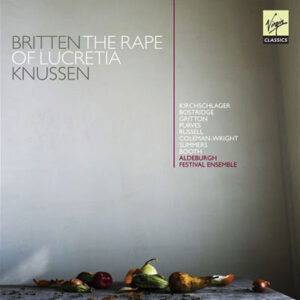Recorded live at Aldeburgh over two evenings in June, 2011, this is a vital performance of one of Britten’s least popular and thorniest works. Scored for a chamber orchestra, with a libretto by Ronald Duncan that, except for the rape scene itself, seems designed to remove the listener from the emotionality of the situation, the overall experience rarely satisfies. And precisely why Britten decided on an epilogue—delivered, as is much of the narrative, by both male and female chorus—that suggests divine forgiveness after a plot in which there is no room for forgiveness, remains a mystery. He undercuts feeling with an entirely “outside” viewpoint. Could he have wanted the audience kept at a distance? Duncan’s artsy, poetic libretto does that all by itself. British stiff-upper-lip? I hope not.
All of that having been said, there are, as usual with Britten, remarkable things about this opera. I suspect the harp never has been used more effectively by any other composer of opera (no, not even Wagner’s six harps in Rheingold) and the sadness expressed by the English horn after the rape is even more dire than the winds Verdi offers to Desdemona in her “Willow Song”. The mania created by the Male Chorus describing Tarquinius on his horse is unique; the tranquility of the women at home as we first hear them is lovely and lolling; the initial confrontation between Tarquinius and Lucretia after he awakens her with an unwelcomed kiss is terrifying, and in general, Britten creates just the right atmosphere—in this case, foreboding and gloom—that the story needs. If only it all weren’t so bleak.
This performance is wonderful, with the surprise being the Lucretia of Angelika Kirschlager. In unaccented English she at first conveys an almost Penelope-like loyalty, then outrage (her opening “what do you want?” to Tarquinius is fierce, all the more so because we know that her ferocity will do no good), and eventually a type of hideous resignation and hopelessness that can only end in suicide. The sense of antiquated sexual values that pervade this work remains off-putting, and here it is, crystal-clear. Kirschlager’s voice is warm and colorful—she is only minutely less fine than Janet Baker on the Britten-led performance (Decca) from 1971—and her performance is magnificently upsetting. She does not stand a chance against the cruel Tarquinius of Peter Coleman-Wright, in a superb reading of the role.
Ian Bostridge certainly outsings the aging Peter Pears (from the ’71 recording) as the Male Chorus, imbuing each phrase with a true story-teller’s genius: from sheer narrative to the full-throated instructions in Tarquinius’ ride to the “peace-making” epilogue, he’s simply superb. (Yes, so is Pears, in every way except vocally.) His handling of the florid music seems natural and organic. Susan Gritton sings the Female Chorus with as much drama and (later) sadness (“Is it all? Is all this suffering and pain/ Is it all in vain?”) as possible. Christopher Purves’ bass is handsomely used as Collatinus and Hilary Summers’ odd timbre works ideally here as Bianca.
Much credit is due to Oliver Knussen’s leadership and to the 13 players of the Aldeburgh Festival Ensemble, not to mention the superb recording, which seems at times to be three-dimensional. In short, if you own the Britten/Decca recording, you should be satisfied, but this new entry is breathtaking.
































